‘We’re back to governing’
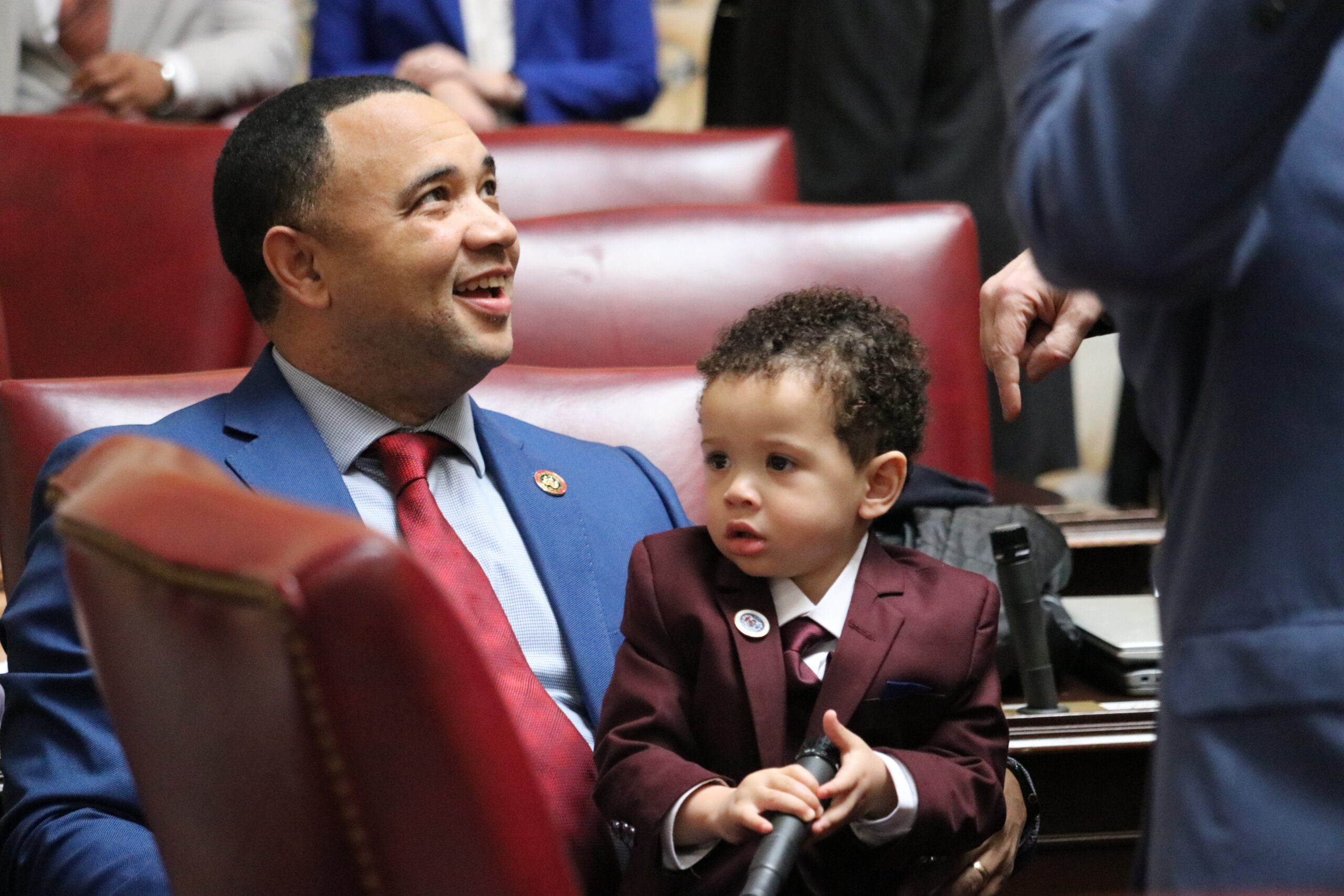
Maryland’s Senate president vowed a return to a more normal 90-day General Assembly session following four years marked by transition and pandemic.
The House of Delegates and Senate returned to Annapolis on Wednesday and gaveled in the 446th legislative session. A winter storm that 24 hours earlier flooded parts of the state including the capital did little to dampen the mood of lawmakers returning from a nine-month break.
Shortly after the Senate gaveled in and tended to housekeeping business, Senate President Bill Ferguson (D-Baltimore City) exhorted his colleagues to think boldly and act aggressively.
“Where’s our crisis? Where’s the crisis?” Ferguson mused. “The good news is, we’re back to governing.”
Gov. Wes Moore (D), Ferguson and House Speaker Adrienne Jones (D-Baltimore County) face weighty issues. A year ago, the state was flush with cash and a historic budget surplus.
The surplus mirage created by federal pandemic aid has faded. State leaders now face a structural budget deficit in each of the next five years that balloons to more than $2 billion at the end of the current outlook.
Also on the agenda are debates over approaches to juvenile crime, aid-in-dying, $3.3 billion in proposed cuts to state transportation aid, and counties clamoring for some relief from the budgetary pressures created by the implementation of the Blueprint for Maryland’s Future education reforms.
Other issues will inevitably demand legislative attention lawmakers adjourn in April.
This is the fifth regular session on the rostrum for both Ferguson and Jones.
Despite the weather event just 24 hours earlier, the state capital and its leaders are prepared to settle into a routine that looks different from their first four years.
“In 2020, I brought you the pandemic,” Ferguson joked.
The COVID- 19 pandemic forced the first early adjournment of a General Assembly session since the Civil War.
It continued affecting legislative operations the following year.
The Senate floor was configured with 47 individual pods for its members, which prompted Ferguson’s predecessor, the late Senate President Thomas V. Mike Miller Jr. (D) to observe, “You’ve turned the Senate chamber into a kindergarten.”
The House, in an effort to spread out its 141 members, housed some delegates in the traditional chamber. The other half were housed in an auxiliary chamber created in the House office building where members participated remotely.
The 2022 session was dominated by redistricting and the election, while 2023 brought a new governor and dozens of rookie state lawmakers. 2024 marks a normalization of operations, Ferguson said.
Jones all business, promotes “decency agenda”
The scene inside the House of Delegates was euphoric as Jones was renominated to lead the 141-member chamber.
Jones said the House must pass a balanced budget “facing difficult fiscal realities,” maintain the state’s transportation system, and assess policies of the state Department of Juvenile Services, state’s attorneys and law enforcement agencies.
A rousing applause came from fellow Democrats when the speaker vowed to “keep our commitments to the Blueprint,” the multi-billion-dollar education reform plan. Jones said one of her main priorities will be to promote the “decency agenda,” a package of bills focused on combating hate and prejudice, including against Jewish and Muslim people.
“This work is on us. It’s our job to have these tough conversations and they need to be done in decency and in order,” she said. “I want to make it very clear: decency doesn’t mean you will compromise our values. We know that we’ll never agree on everything, but our disagreements don’t have to turn us into enemies.”
She continued: “We will do this work in humility and with expediency. We will talk and then listen to each other. We’ll keep an open mind to ideas and opinions that are different from our own.”
Moore considers taxes, aid-in-dying
The governor will have a role to play in the session.
Moore is expected to have a legislative package of a dozen or so bills dealing with data centers in the state, the shortage of law enforcement officers, housing, and military families.
He may also have to weigh in on issues ranging from taxes to aid-in-dying.
Lawmakers are expected to at least discuss how to increase revenues to offset proposed transportation cuts and stabilize state finances.
Moore, during his campaign and in his first year, said he opposed tax hikes.
Heading into his second year, the governor expressed hesitance but did not reject the idea of an increase.
“We know that we are going to be fiscally disciplined,” said Moore. “Any conversation about taxes, for me, is going to have a very high bar.”
The governor criticized how the state pays for transportation projects as antiquated and too reliant on diminishing gas tax collections.
A year ago, Moore called for an end to automatic annual increases that have been tied to the rate of inflation for the last decade. The governor said such increases disproportionately impact working families.
Ending the automatic increases would decrease taxes collected for the dedicated Transportation Trust Fund.
Moore, speaking Wednesday, said there should be a safety valve in times of high inflation. He suggested the Board of Public Works, a three-member panel he chairs, could provide oversight.
“There should be a greater ability for us to be able to intervene in case of emergency,” said Moore. “I think that having that measurement of flexibility is responsible for a governing body. Again, I think this is part of a broader conversation about how the state thinks about transportation. That’s just one component that I think needed to be addressed.”
Moore also appeared to acknowledge that a promise he made to cut an estimated 10,000 vacancies across state agencies and higher education in his first year may have been the wrong goal.
“I actually don’t think that I gave the right metric,” Moore said during The Daily Record’s Eye on Annapolis opening day event.
Moore said he should have set “the right goal.”
“The goal is to make sure that we have a state government that’s responsive to the people,” he said. “The goal is to make sure that we don’t have people who have to wait 18 months to get their unemployment insurance. The goal is to make sure that when people actually call 911, that someone responds. The goal is to make sure that whether you’re going to the MVA or the Department of Labor or the Department of the Environment, that you actually have a government that can see you and be responsive to you.”
By September, the administration had only hired between 800 and 900 net new employees. Moore said Wednesday that by December that number had increased to under 1,300 — far fewer than the 5,000 initially promised.
Moore may also have to decide whether to sign a controversial and emotional proposal to allow the terminally ill to seek medical aid-in-dying.
The contentious question of whether doctors and physicians should be permitted to facilitate the death of a terminally ill patient at their request has come up in previous sessions, but advocates for the legislation are hopeful that 2024 will be the year it passes.
Those in opposition of medical aid-in-dying policies argue that the procedures could be abused and misused against disabled and terminally ill patients. Others object on religious grounds.
“It’s a really difficult issue,” said Moore. “We need to see what the final bill is going to look like.”
A final version “with dignity at its core,” would be more likely to be signed, Moore said.
“If a bill, when it comes to aid in support of people making the final transition, if a bill like that makes it to my desk, then I would sign it,” he said.
Medical aid-in-dying legislation has not yet been filed, but will likely be sponsored in the House by Del. Terri Hill (D-Howard). Hill is also a physician.
Ferguson highlighted medical aid-in-dying legislation Wednesday morning at a press conference, reaffirming that it will “probably get a vote this year” in the Senate.
“We have not brought it back up until we thought that the timing was right. It’s going to be a hard issue,” Ferguson said.
Advocates hit the ground running
Less than two hours before the 2024 legislative session began, Stacey Conn and Robin Megibow distributed calendars at the House of Delegates building.
When they walked inside the House Environment and Transportation Committee office, one of the staff members saw the picture of a dog on the front calendar and said, “Ooh!”
Besides close-up photos of birds, rhinoceroses, and cats, tucked inside the calendar is a one-page summary of this session’s priorities for the Humane Society.
One of them deals with the requirement for all chicken eggs farmed and sold in the state to come from birds not cooped up in so-called battery cages. Sen. Karen Lewis Young (D-Frederick) pre-filed Senate Bill 193, which would take effect Jan. 1, 2026.
“Need to make Maryland cage free,” Megibow said. “It’s not just about the health of the animals, but also the health of people.”
Shortly after the two chambers adjourned, three dozen climate activists gathered on Lawyers Mall outside the State House to rally for passage of the RENEW Act, a bill that would make fossil fuel companies pay for environmental degradation in Maryland.
Parts of downtown Annapolis flooded dramatically overnight Tuesday following torrential rains – with sea levels rising as high as five feet. Several protesters held signs showing other climate catastrophes in Maryland, including flooding in Ellicott City, wildfires in Owings Mills, and smoky skies in Baltimore.
The bill’s sponsors, Del. David Fraser-Hidalgo (D-Montgomery) and Katie Fry Hester (D-Howard), estimated that the bill would generate about $9 billion and would help the state pay not just for environmental remediation but for several initiatives the state needs to combat climate change.
“This is the year to do it,” Fraser-Hidalgo said. “This is the money we need.”
Hester said supporting the legislation should be a no-brainer.
“What don’t you like about $900 million a year so we can clean up our state?” she said.
Jamie DeMarco, Maryland director for the Chesapeake Climate Action Network, which organized the rally, said 40 different organizations have made passing the bill a top priority for this year’s legislative session.
Activists for the immigrant rights group CASA also returned to the State House, calling for expanded health benefits for undocumented immigrants.
A bill passed in the House but did not make it out the Senate last year. Supporters of the bill protested on the steps of the State House and were briefly arrested, with their charges later dismissed.
“The state of Maryland has been working for decades on ensuring that more and more Marylanders have access to insurance. However, within these efforts, we’ve seen that the immigrant community has unfortunately been left behind,” said Ninfa Amador-Hernandez, a policy analyst for CASA. “Our members keep bringing it up to us that the sole thing that would impact their quality of life the most would be having access to health insurance in the state that they live in, work, pay taxes and are building their communities up in.”
The group is also calling for passage of legislation — House Bill 24 and Senate Bill 96 — requiring health impact studies to determine if a new environmental permit would “impact an underserved or overburdened community.”
“For too long, polluting businesses have been popping up in areas where poor people live, immigrants live, African Americans live,” said Jose Coronda Flores, a climate researcher and policy analyst with CASA. “This bill gives the Maryland Department of the Environment the ability to reject [a permit] if the facility wants to open up in a place that already has too much pollution.”
An anticlimactic House vote
One major change in the House chamber is the person second-in-command.
Del. Dana Stein (D-Baltimore County) will serve as speaker pro tem, replacing Del. Sheree Sample-Hughes (D-Lower Shore), who served in that position since 2019. It marked the state’s first time in history that two Black women, Jones and Sample-Hughes, led the chamber.
“I was sent here by the citizens of District 37A,” Sample-Hughes said in an interview after the House adjourned. “…I’m going to continue to fight for what I believe in and for the people of the entire Eastern Shore. It’s about people. A title doesn’t define me.”
It was announced on the House floor that Sample-Hughes will now serve on the House Judiciary Committee. She previously was on the Economic Matters Committee.
Sample-Hughes is no stranger to criminal justice policy. She served on the Governor’s Correctional Standards Commission from 2008 to 2014.
She said battling crime remains a top priority in places such as Cambridge and Salisbury. Resources are scarce, however, for county and municipal governments, law enforcement and other agencies. The main focus, she said, is collaboration.
“I pray that our executive branch here understands that we can work together,” she said. “We want to make sure we’re operating with accurate information and understanding what supports we can have from the state and what the challenges are, whether it’s funding or whether it’s personnel. It’s important we continue in that fashion.”
Senate remembers Doug Peters
The Senate adjourned Wednesday in memory of the late state Sen. Douglas J.J. Peters (D), who represented the Bowie area from 2007-2021 and died last month from multiple myeloma.
Over his Senate career, Peters was a majority leader, chair of the Capital Budget Subcommittee, chair of the Prince George’s County delegation, and chair of the legislature’s Veterans Caucus.
Senate Majority Leader Nancy J. King (D-Montgomery) paid tribute to her friend, describing his devotion to public service and his family, their ability to see eye-to-eye on most issues, and how he always made her laugh. She recalled that after teasing him once about an overly tight shirt, she was called to his office later for a visit, only to find him sprawled on a couch holding a flower in his mouth.
“Just to entertain me,” she said, prompting a mix of laughter and tears within the chamber.
King said she last spoke to Peters about three weeks before he died.
“I thought he was doing OK,” she said. “I thought he was hanging in there. But it just didn’t happen.”
“He was truly, truly a great man, and he’s sorely missed,” Ferguson agreed.
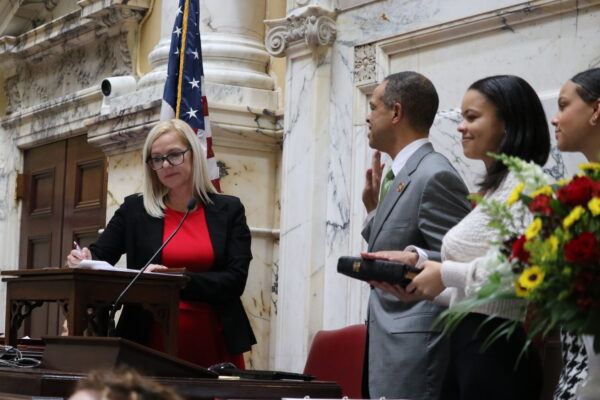
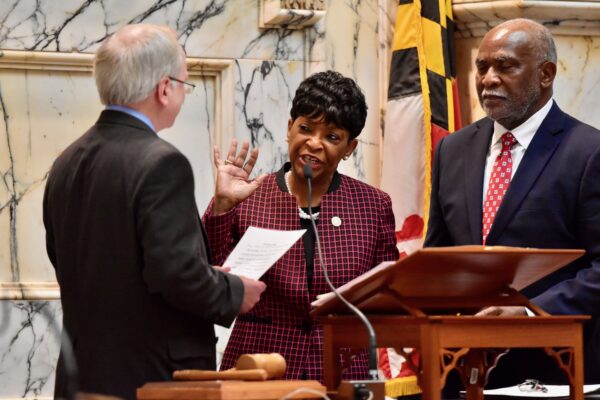
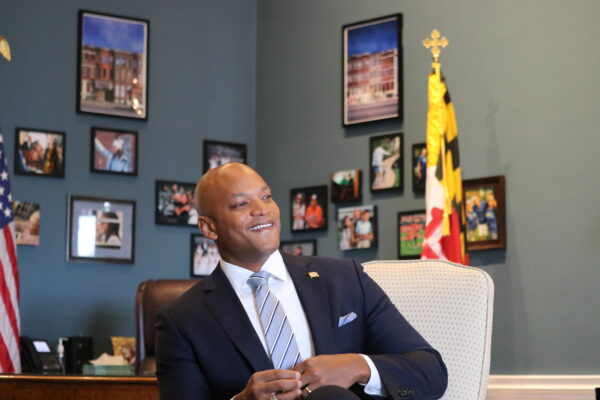
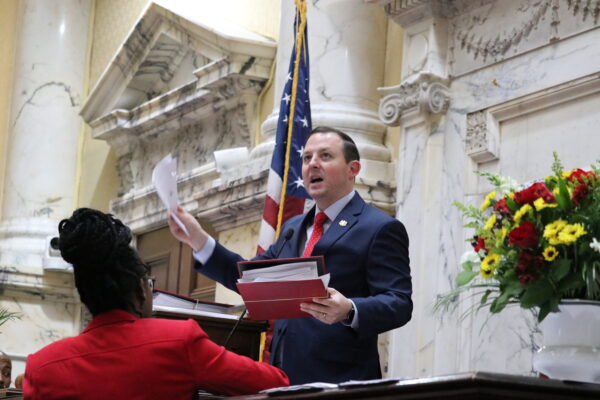

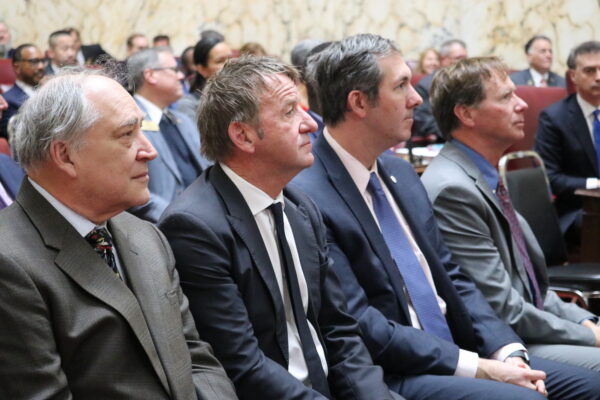
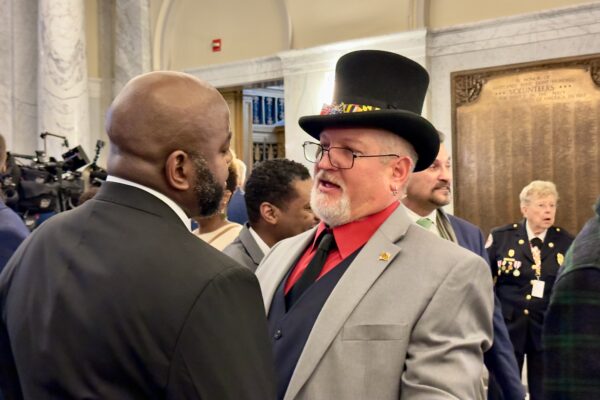
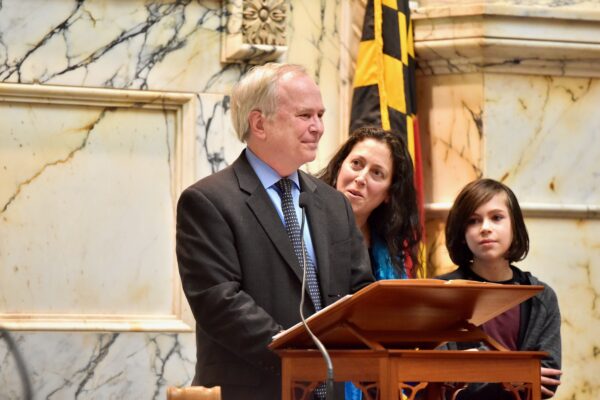
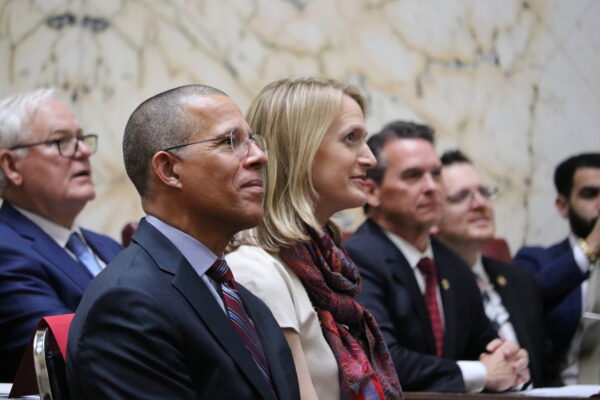
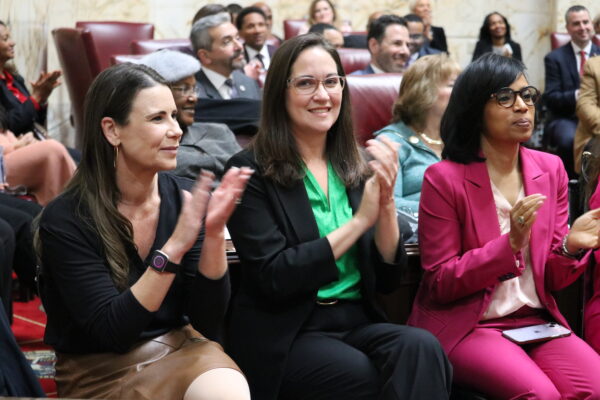

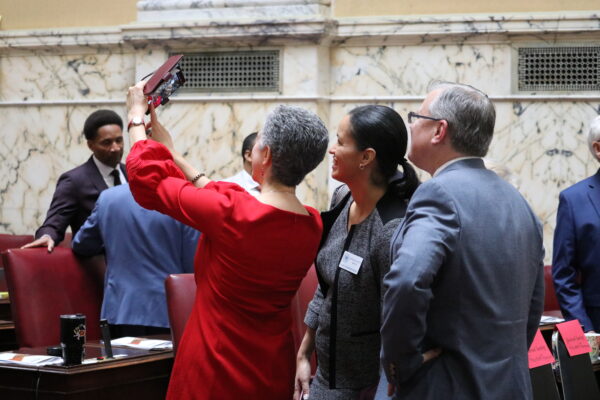








 Creative Commons Attribution
Creative Commons Attribution